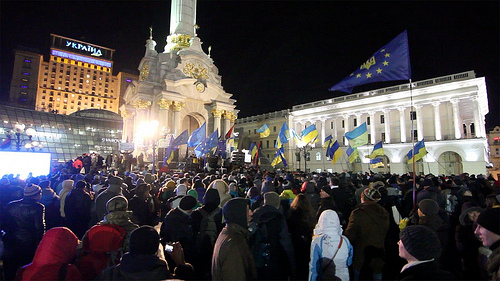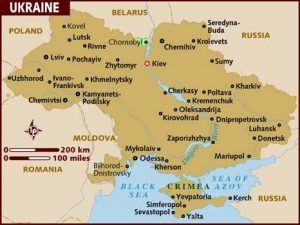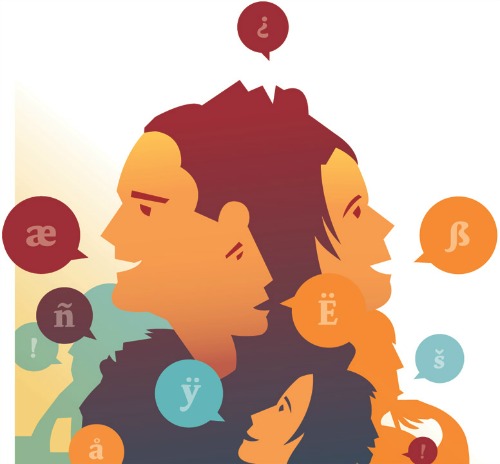
by World Moms Blog | Mar 10, 2014 | 2014, Awareness, Bilingual, Communication, Cultural Differences, Culture, Elections, Eye on Culture, Guest Post, Human Rights, Humanity, International, Language, Life Lesson, Living Abroad, Media, Multicultural, Politics, Tragedy, USA, World Events, World Interviews, World Motherhood, World Tour, World Voice
Today, we have a special guest post by a Ukranian mother living in the United States, Olena Centeno, of Bilingual Kids Rock. Olena opens the window and lends us her personal perspective to the current events in Ukraine…

Protest in Kiev, November 2013
What’s it like growing up in Ukraine?
As a Ukrainian, I grew up speaking two languages: Russian and Ukrainian. I ate Ukrainian borsht for lunch and Russian pelmeni for dinner. I love Tchaikovsky’s Sleeping Beauty and Carols of the Bells by Leontovych. I am raising my own children trilingual in English, Russian and Ukrainian. In fact, the two cultures (Russian and Ukranian) are considered so close, that if an Ukrainian abroad says s/he is from Ukraine people often say “Oh, so you are from Russia?”
What’s going on between Russia and Ukraine?
With Russian troops moving across the sea into Ukraine’s Crimean peninsula, a lot of Westerners are starting to ask this question.
The current conflict in Ukraine is more than three months old. It began with a peaceful demonstration on November 21 at Independence Square (Maidan) in Kiev, the capital of Ukraine, when the (now ousted) Ukrainian president (Yanukovich) hesitated to sign an Association Agreement with the EU. This had been one of his major election promises and in breaking it he ignored the desire of millions of Ukrainians.
During the past three months, the “EuroMaidan” demonstration has grown into a much bigger movement. It started as a response to the failed EU deal but then truly turned into a movement against the corrupt government of president Yanukovich, who moved to keep Ukraine in long-lasting and very painful economical ties with Russia.
Then, after the government passed harsh, anti-assembly laws, it became about the basic human right to be able speak and think freely without being punished for it.
More than a hundred lives were lost and thousands injured during violent attempts to remove the demonstrators but people did not leave the cold streets of Kiev. More freedom fighters came from all over Ukraine to support them. Many other Ukrainian cities stood up as well. After three months of struggle, Mr. Yanukovich was impeached and left Ukraine (he refused to sign a resignation; he just ran away). His presidency was considered illegitimate and a new, temporary government was elected.
As Ukrainians were mourning over lives lost and looking into the future with great hope to build their country on principles of trust and freedom, a new enemy emerged: Informational War.
Along with Russia, Eastern Ukraine—where the majority is Russian speaking—is dominated by Russian-language news from the Russian media. Unfortunately, the Russian media coverage of events that have happened over the past three months is falsified [and full of propaganda].
Now, after the armed occupation of Ukrainian territory in Crimea by Russian troops, the reason for their untruthful reporting is understood: Creating social opinion in Russia and Russian-speaking Ukraine justifies military intervention into Ukrainian territories.
Personally, I think Mr. Putin has an imperialistic plan to be the most powerful ruler in modern history—politically and financially—and he will stop at nothing to add Ukraine to his control.

Russian Media Propaganda Uncovered
The following are all lies that have been spread by the Russian media leading up to the invasion of Ukraine by Russian troops:
1. FALSE: Kiev was Overrun by Violent Riots
Despite violent clashes, most of Kiev stayed peaceful throughout the demonstrations. The day-to-day lives of residents were largely unaffected outside of Independence Square and the areas immediately surrounding it. Very little of Kiev or the surrounding countryside was damaged or disturbed by the protests.
I know this because I called my family and friends every day. My nephews were going to school as usual, most of the people attended work on a daily basis, and all shopping malls and grocery stores were working (except for a few in the middle of the protest areas downtown).
2. FALSE: Anti-Russia Fascists Led the Ukrainian Protests
The vast majority of protesters were ordinary citizens tired of a government that they viewed as corrupt and unwilling to listen to the people. There were no fascist elements leading the demonstrations, and there are none leading the new government.
Many of the people I know personally were in Maidan: teachers, IT professionals, doctors, stay-at-home moms, businessmen, university professors, hair stylists and many others. People I worked with and went to school with. And no one will ever convince me that they are fascists. My daughter’s god-father is a surgeon and worked days and nights protecting the health and saving the lives of many.
3. FALSE: The New Government Will Force All Ukrainians to Speak Ukrainian
This is a particularly effective myth for Russian-language media, since it appeals directly to the people who would be most affected. Language has long been a contentious issue in Ukraine. Claims that Russian will be abolished are being used to generate anger against the new government.
The Ukrainian parliament voted to repeal a 2012 law allowing the establishment of minority languages as official state languages in individual provinces on February 23, 2014 but acting President Oleksandr Turchynov vetoed the move. Russian is currently recognized as an official language, is legal for state use in several Ukrainian provinces, and is guaranteed state protection “in all spheres of public life” in Crimea specifically.
I speak Russian and Ukrainian to my children here in the USA. I see language first and foremost as a tool for communication — and shame on any politicians who use it as a reason for war.
4. FALSE: Ukrainian Demonstrators Have Been Attacking Russians or Russian-Speakers
Another unproven and untrue claim widely circulated in Russian-language media is that the Euromaidan protesters were deliberately attacking Russian speakers.
The cruel result is that ordinary Russians – good, wholehearted, educated people – are now eager to help a Ukraine that they think is swamped by fascists! I have family in eastern Ukraine and my god-mother lives in Moscow. They have called multiple times, scared for the lives of my parents in Kiev. They really think Ukraine is in danger.
There is no evidence to support the claim, and nearly all cases of violence during the protest were perpetrated against civilians by security forces. The Euromaidan protests had very little to do with cultural or language issues in general.
While Yanukovych’s perceived obedience to the Russian government was certainly a source of anger in Ukraine, this anger was directed at the President and the actions of the Russian and Ukrainian governments, not to the Russian people or culture.
5. FALSE: The Berkut and Other Security Forces Fought in Self-Defense
Russian news broadcasts have shown extensive footage of the Berkut and other riot police under attack but nearly none of their attacks on civilians. The reality is that security forces attempted to crush peaceful protests with deadly force, and were barely driven back with improvised weapons like clubs and Molotov cocktails. The superior force and aggression were always on the side of the Berkut.
6. FALSE: The Independence Square/Euromaidan Protests Were Organized by Americans
We joke that EuroMaidan is now supported by Americans because my American husband and I made donations to help supply people with warm clothing and blankets during cold winter months.
I am not claiming that on a political level there is no lobbying of interests from outside countries and unions but once again: the politics of the country and the people of the country are two different things.
The vast majority of protesters were native Ukrainians and ordinary residents of Kiev and the surrounding country.
7. FALSE: Fascism Will Spread from Ukraine to Russia
This is another falsehood dependent on the idea that the Euromaidan demonstrators were fascist extremists. It is being used as a justification for Russian invasion. The Russian government claims it is defending Russian-speakers in Ukraine and its own borders from Ukrainian fascists but in reality those fascists do not exist.
What is next?
The military intervention is not over. It is hard to say what is going to happen next. There is a lot of talk going on at a very high, political level involving the EU and the US.
But Ukrainians have already had the biggest win in this struggle: themselves.
They proved to themselves that they care:
- They care about all of our people (amazing examples of collaboration happened during the civil unrest!);
- they care about the future of their country;
- they care about their freedom;
- they care enough to recognize the differences among themselves and to stay united anyway.
The revolution was heartbreaking and tearful but as a result, Ukrainians became true patriotic citizens of their country:
Glory to Ukraine, Glory to Heroes!
слава Україні, слава героїв
(slava Ukrayini, slava heroyiv)
For me, personally, it has been a life lesson in how to raise my own children. I have a clear goal to raise multicultural and multilingual children, who respect other languages and cultures and can see our shared humanity no matter how politicians try to divide us.
This is an original guest post to World Moms Blog by Olena Centeno.
 Olena Centeno is a Ukrainian who lives in USA, a happy mom of three wonderful kids ages 2-9 and a wife to the great. She speaks three languages herself and is raising her kids to be multilingual in English, Russian, Ukrainian and Spanish. She founded Bilingual Kids Rock, where she helps families on their bilingual journey. She also enjoys photography and video making as a way to preserve precious moments of life.
Olena Centeno is a Ukrainian who lives in USA, a happy mom of three wonderful kids ages 2-9 and a wife to the great. She speaks three languages herself and is raising her kids to be multilingual in English, Russian, Ukrainian and Spanish. She founded Bilingual Kids Rock, where she helps families on their bilingual journey. She also enjoys photography and video making as a way to preserve precious moments of life.
You can connect with her at Bilingual Kids Rock.
Photo credit to Oxlaey. This photo has a creative commons attribution license.
World Moms Blog is an award winning website which writes from over 30 countries on the topics of motherhood, culture, human rights and social good. Over 70 international contributors share their stories from around the globe, bonded by the common thread of motherhood and wanting a better world for their children.
World Moms Blog was listed by Forbes Woman as one of the "Best 100 Websites for Women 2012 & 2013" and also called a "must read" by the NY Times Motherlode in 2013. Our Senior Editor in India, Purnima Ramakrishnan, was awarded the BlogHer International Activist Award in 2013.
More Posts

by Olga Mecking | Feb 3, 2014 | 2014, Awareness, Being Thankful, Bilingual, Culture, Education, Expat Life, Humanitarian, Inspirational, Language, Life Lesson, Living Abroad, Millennium Development Goals, Motherhood, Moving, Netherlands, Philanthropy, Shot@Life, Social Good, Stress, World Motherhood
 Until a friend of mine had a terrible tragic accident in the Himalaya mountains that left her in a coma, I had never donated to a charity. We collected some money at our wedding to give to her husband, and my mom also donated some money to a charity that takes care of her, but that was it.
Until a friend of mine had a terrible tragic accident in the Himalaya mountains that left her in a coma, I had never donated to a charity. We collected some money at our wedding to give to her husband, and my mom also donated some money to a charity that takes care of her, but that was it.
Since moving to another country and having children, I have been looking for ways to help others. I want to donate to more charities. I am just looking for the right one.
It isn’t easy. I have heard of many charities that have turned out to be scams or which just took people’s money and ran.
My situation is especially difficult because I live in a foreign country and do not know about the charities here. Though my Dutch is fluent, I still have trouble communicating in this language sometimes. In the Netherlands, many people go house-to-house collecting money for charities.
I think it is interesting to find out about charities that way because they’re often ones I’ve never heard of before. They are often small scale actions rather than big ones. But I think the mistake they’re making is the following one: before I contribute, I’d like to find out more about the organization, whether my friends have heard of it, whether there is something about them that raises red flags.
I think I might even agree to donate money if they were willing to leave a business card or something I could find them by. Instead, they want me to make a monthly commitment. Again, because I do not know them, I am not so keen on giving them my credit card number.
At the same time, my heart breaks for all the little children going through invasive treatments; who are terminally ill; who look like little ghosts because they have lost so much weight from all their chemo; for all the sick people who can’t get the treatment they need; or for children who are not so fortunate as mine; or moms in poorer countries, who have to travel for many days if they want to give birth in a hospital.
I really want to help. Since I became a mom and later a World Moms Blog contributor, I have been made aware of needs and dreams that can’t be fulfilled because of the bad conditions all around the world.
But the fact is that finding the right charity isn’t easy. I mostly say no to these door-to-door people. I do it with a heavy heart. I just want to make sure that I am really helping people in need, and not wasting my money.
Luckily, while looking for a charity to donate to, there is a lot I can do:
- In my circle of friends alone, there have been situations where help was needed, including domestic violence and pregnancy problems.
- I am considering taking the Shot@Life pledge and becoming a Champion.
- I can learn as much as I can about actions such as #MDG’s and participate in our Twitter Parties.
- I can find local communities, organizations, charities and brands.
- Many of my friends are absolutely talented people and use their talents to collect money for a good cause, and I can help them spread the word and participate.
I know this sounds like nothing, and I am not telling this to show off how good of a person I am. It is just to show that even though it sounds like nothing, we all can make a difference. I am still very new at this social good cause. I still have a lot to learn. Already I have asked my fellow World Moms Blog contributors for help choosing a charity I can actually trust and they have come up with great charities.
I need to do more. I want to do more. I will do more.
Do you have a charity or cause worth supporting? Tell us about it and help spread the word
This is an original post to World Moms Blog from Olga Mecking in The Netherlands.
The image used in this post is credited to Images Money. It holds a Flickr Creative Commons attribution license.
Olga is a Polish woman living in the Netherlands with her German husband. She is a multilingual expat mom to three trilingual children (even though, theoretically, only one is trilingual since she's old enough to speak). She loves being an expat, exploring new cultures, learning languages, cooking and raising her children. Occasionally, Olga gives trainings in intercultural communication and works as a translator. Otherwise, you can find her sharing her experiences on her blog, The European Mama. Also take a while to visit her Facebook page .
More Posts - Website
Follow Me:




by hjunderway | Nov 18, 2013 | 2013, Bilingual, Cultural Differences, Culture, Education, Expat Life, Eye on Culture, France, International, Living Abroad, Milestones, Motherhood, Moving, Preschool, Relocating, School, Stress, Traditions, USA, Working Mother, World Moms Blog, World Motherhood, Younger Children
 The day I gave birth to my son, HJ, is a day I’ll never forget. Induction nightmare? Check. Post baby snuggles? Check. September 3rd birth date? Check.
The day I gave birth to my son, HJ, is a day I’ll never forget. Induction nightmare? Check. Post baby snuggles? Check. September 3rd birth date? Check.
Little did I know at the time how much my son’s birthday would impact his development and education but flash forward to 2013 and here I sit, faced with the first of many educational concerns.
Living in Paris meant that on September 4th, 2012, my son formally entered the French education system. At just three years old, he was invited to attend nursery school, or maternelle, which comprises the first three years of schooling. Due to his inability to speak French, my son was invited to attend school four mornings per week from 8:30 a.m. until 11:40 a.m. As he began to thrive in school, his teacher gently suggested that I begin leaving him for one full-day per week after the holiday break in December. By late-January, he was attending school all day until 4:15 p.m., eating French catered lunch in the cantine (cafeteria), enjoying rest time, and thriving.
Combining his easy going attitude and tall stature (95% percentile for height), most parents thought my son was one of the older kids in the class. In order to start school in September, children must turn three by December 31st, and with a September 3rd birthday, my son was one of the younger students. When I would share this with the parents, they’d say, “Wow, but he is so tall!”
Our plans for HJ’s education were that he would be in French school until we moved home, and at that point he’d transition into kindergarten at the local school. When our contract ended sooner than expected, I began the joyous task of figuring out what options we had to continue HJ’s formal education, and the results were shocking.
HJ misses the US cut-off for kindergarten by two days. This means that he has to wait until he is six to enter kindergarten! I neatly placed that reality aside and instead focused on what education he could receive now, at four years old.
My choices floored me.
Option A) the public school offers a “lottery” for kids ages 3-4 for preschool, and the schedule only allows kids to get one of three spots: two mornings from 8-11, three mornings, four afternoons, or five mornings. And all this for the staggering price of more than $6,000.
Option B) the local Montessori school, which has no openings until September of 2014, and again runs mornings only. Did I mention that they also refused to reveal the actual cost of the program?
And finally, Option C) a local Catholic school that offers five all-day classes for around $7,000.
So what’s the big deal?!
Children in France have access to all-day education beginning at age three for FREE, with master’s degree trained teachers. While every school isn’t as amazing as the one my son attends, the French may be on to something. For two working parents, morning-only, formal education settings are an inconvenience, and for single-income families, shelling out over $6,000 for a few hours a day may be too much.
All around the United States, parents are struggling with making hard financial decisions and I wonder if it seems fair that we have to do so when it comes to our children’s educations?
For us, having HJ evaluated and exploring how he measures up to his peers is one solution. How he falls in the range of social and emotional intelligence will give us a window into how he may fair in kindergarten and will be necessary if we plan on fighting the school district for a spot in kindergarten if it seems logical and appropriate for our son.
The second option is to just ride the wave and instead allow our six year old to join his peers, perhaps giving him a leg up on his classmates. Then I question, “Will he be bored?” “Too big?” At this point I’m just not sure which choice is best for our little guy but it did get my wheels moving, wondering about the significant differences in how each country approaches education. What is it like for children in Germany, or Canada? Do parents struggle with similar issues in Sydney, Australia?
So please, World Moms Blog readers, share your location/country’s educational process! When does school begin? When did your children start school? Anything you wish you could change about your child’s educational experiences?
This is an original post to World Moms Blog from Jacki, mother of one now living in XXX but formerly blogging from Paris, France.
Jacki, or “MommaExpat,” as she’s known in the Internet community, is a former family therapist turned stay-at-home mom in Paris, France. Jacki is passionate about issues as they relate to mothers and children on both domestic and international scenes, and is a Volunteer Ambassador for the Fistula Foundation. In addition to training for her first half marathon, Jacki can be found learning French in Paris and researching her next big trip. Jacki blogs at H J Underway, a chronicle of her daily life as a non-French speaking mom in France.
More Posts

by Salma (Canada) | May 24, 2013 | Bilingual, Canada, Communication, Culture, Education, Family, Kids, Language, Motherhood, Multicultural, Parenting, Salma, World Motherhood, Younger Children

I am trying to teach my youngest child three languages. I am determined to make it work, even if I only speak one perfectly. I am making a conscious decision to do something that is almost as awful as pulling teeth (in my opinion). I am determined to force myself to come out of my comfort zone, even if it means being laughed at; yes, it happens sometimes. My attempts to teach my young child English, Arabic and French were inevitably a disaster waiting to happen, except that it happened right away. It is a deliberate act of madness on my part, and I hope that my son makes it out alive.
Here’s a little background on my adventures. I have always been a passive bilingual. In my case, I understand spoken French (mostly), I understand written French (greatly), and I can speak some French. The problem is, as the years go by, my linguistic ability coupled with my self-confidence dwindles. And boy is it ever complicated! Along with my love for French, I found it necessary to study and learn Arabic – I married an Arabic speaker. Sure, he speaks English, but my mother-in-law doesn’t speak more than ten words of English.
Learning a new language in your late 20’s is something different. I have always respected immigrants who move to new countries and learn the language (through no choice of their own of course), but now I respect them ten-fold. (more…)

An Imperfect Stepford Wife is what Salma describes herself as because she simply cannot get it right. She loves decorating, travelling, parenting,learning, writing, reading and cooking, She also delights in all things mischievous, simply because it drives her hubby crazy.
Salma has 2 daughters and a baby boy. The death of her first son in 2009 was very difficult, however, after the birth of her Rainbow baby in 2010 (one day after her birthday) she has made a commitment to laugh more and channel the innocence of youth through her children. She has blogged about her loss, her pregnancy with Rainbow, and Islamic life.
After relocating to Alberta with her husband in 2011 she has found new challenges and rewards- like buying their first house, and finding a rewarding career.
Her roots are tied to Jamaica, while her hubby is from Yemen. Their routes, however, have led them to Egypt and Canada, which is most interesting because their lives are filled with cultural and language barriers. Even though she earned a degree in Criminology, Salma's true passion is Social Work. She truly appreciates the beauty of the human race. She writes critical essays on topics such as feminism and the law, cultural relativity and the role of women in Islam and "the veil".
Salma works full-time, however, she believes that unless the imagination of a child is nourished, it will go to waste. She follows the philosophy of un-schooling and always finds time to teach and explore with her children. From this stance, she pushes her children to be passionate about every aspect of life, and to strive to be life-long learners and teachers. You can read about her at Chasing Rainbow.
More Posts - Website

by hjunderway | Sep 28, 2012 | Bilingual, Communication, Culture, Education, Family, Family Travel, France, Husband, International, Kids, Language, Living Abroad, Motherhood, Parenting, Preschool, Relocating, Travel, World Motherhood, Younger Children

Photo of author’s son in Paris, France.
In my other life, as I like to call it, I was the translator. I often found myself sitting at a kitchen table with school documents sprawled out between me and an anxious mother. As a family therapist with seven years of Spanish classes behind me, these were the moments that most overwhelmed me. A mother sitting across the table, watching my mouth for familiar words, nodding her head with approval, or murmuring, “No entiendo” when confused. Slowly translating each document using basic Spanish vocabulary and many hand gestures, together we unraveled the mysteries of new school enrollment, calming her fears and reservations about sending her child to yet another new school.
In the fall of 2011, I said good-bye to that life and hello, or rather, “bonjour” to a new one. My husband, two-year-old son, and I had accepted an expatriate assignment to Paris, France for two to five years. Once our things were packed and shipped and our house rented, we checked into a hotel and patiently waited for our visas to be approved, a wait we were told could be as much as two weeks. (more…)
Jacki, or “MommaExpat,” as she’s known in the Internet community, is a former family therapist turned stay-at-home mom in Paris, France. Jacki is passionate about issues as they relate to mothers and children on both domestic and international scenes, and is a Volunteer Ambassador for the Fistula Foundation. In addition to training for her first half marathon, Jacki can be found learning French in Paris and researching her next big trip. Jacki blogs at H J Underway, a chronicle of her daily life as a non-French speaking mom in France.
More Posts
by World Moms Blog | Jul 21, 2012 | Bilingual, Culture, Family, Friendship, Gardening, Motherhood, Older Children, Parenting, Saturday Sidebar, Working Mother, World Motherhood, Younger Children

WMB Writer Kyla P’an and her kindred spirit in parenting, Rachel Osen.
There are so many different parenting styles in the world, which makes World Moms Blog writer, Tara B. ask,
“Do you have a kindred spirit in parenting? Aside from the bond of motherhood and the fact that all moms want the best for their kid…is there someone you know who operates just like you on the basic nuts and bolts of day to day parenting? If so, how did you find him/her?”
Check out what some of our World Moms had to say…
Kyla P’an of Massachusetts, USA writes:
“Yes, my friend in Montana, Rachel Osen. I don’t know if it’s because our kids are the same genders and exactly the same ages, or if it’s because our pre-children adulthood was so parallel, but she’s one of the few people I can be so open with about the trials and tribulations of parenting. I feel like we protect or guard our true selves all the time, much like Ruth Wong discussed in Motherhood is NOT a Competition, but I never feel that way with Rachel.” (more…)
World Moms Blog is an award winning website which writes from over 30 countries on the topics of motherhood, culture, human rights and social good. Over 70 international contributors share their stories from around the globe, bonded by the common thread of motherhood and wanting a better world for their children.
World Moms Blog was listed by Forbes Woman as one of the "Best 100 Websites for Women 2012 & 2013" and also called a "must read" by the NY Times Motherlode in 2013. Our Senior Editor in India, Purnima Ramakrishnan, was awarded the BlogHer International Activist Award in 2013.
More Posts


![]() Olena Centeno is a Ukrainian who lives in USA, a happy mom of three wonderful kids ages 2-9 and a wife to the great. She speaks three languages herself and is raising her kids to be multilingual in English, Russian, Ukrainian and Spanish. She founded Bilingual Kids Rock, where she helps families on their bilingual journey. She also enjoys photography and video making as a way to preserve precious moments of life.
Olena Centeno is a Ukrainian who lives in USA, a happy mom of three wonderful kids ages 2-9 and a wife to the great. She speaks three languages herself and is raising her kids to be multilingual in English, Russian, Ukrainian and Spanish. She founded Bilingual Kids Rock, where she helps families on their bilingual journey. She also enjoys photography and video making as a way to preserve precious moments of life.
















